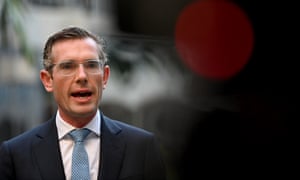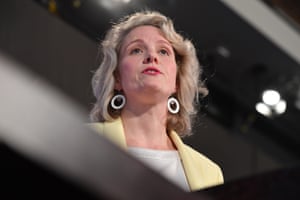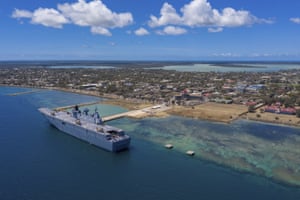21:28
Marise Payne calls on Myanmar military to ‘return the country to the path of democracy’
The foreign affairs minister, Marise Payne, has called on Myanmar’s military to “halt violence against civilians and return the country to the path of democracy”. In a statement issued on the first anniversary of the military coup, Payne said its actions on 1 February 2021 had denied the will of the people.
Since that time, the military has inflicted horrific violence, trampled basic freedoms and triggered humanitarian, security, health and economic crises across the country. Australia condemns the use of violence against civilians and other serious human rights violations. We urge the military to exercise restraint and to release all those arbitrarily detained, including Australian Professor Sean Turnell.
Payne called on the military “to allow immediate and unimpeded access for the delivery of humanitarian assistance to all people in need” and to “engage meaningfully in inclusive dialogue for a peaceful return of Myanmar to the path of democracy”.
As we reported earlier, human rights group and the Labor opposition have strongly criticised the Australian government for failing to implement any additional sanctions against Myanmar military figures or their business interests in the year since the coup.
Payne’s statement is silent on the prospect of new sanctions. But the minister called on the international community “to prevent the flow of arms into Myanmar, to suspend all operational support to the military and its representatives, and to cease the provision of arms, enabling materiel and technical assistance”.
She said Australia would “provide humanitarian assistance to those most in need and remains committed to working with regional and international partners in response to these crises”.
Updated
21:27
Updated
21:23
NSW records 30 Covid deaths and 12,818 new cases
21:14
Updated
21:08
Updated
21:00
Power outage hits Tonga relief vessel
Updated
20:57
20:52
Updated
20:32
Australia a ‘bystander’ to Myanmar bloodshed, a year on from coup
The Morrison government’s failure to impose sanctions against Myanmar junta figures sends a message that Australia is a “mere bystander to authoritarian backsliding in our region”, according to the Labor party.
With today marking one year since Myanmar’s military seized power in a coup, the opposition today joined with human rights activists in urging the Australian government to act to stop the flow of money to the junta.
Labor’s acting foreign affairs spokesperson, Kristina Keneally, said at every stage of the crisis in Myanmar, the government had “acted too late and done too little to demonstrate Australia’s opposition” to the coup and to the “the killing of over a thousand innocent civilians”. She said:
The Morrison-Joyce government’s refusal to act over the past year sends precisely the wrong message – that Australia does not care and that we are mere bystanders to authoritarian backsliding in our region … We join calls from the Australian Council of Trade Unions, Human Rights Watch and the Australian Council for International Development, as well as many other NGOs, for targeted sanctions against the Tatmadaw and linked entities. Mr [Scott] Morrison and the foreign minister must use this anniversary to finally act – and stand up for democracy in our region.
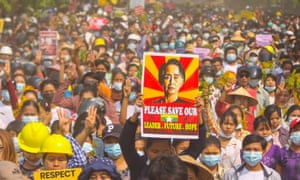
Elaine Pearson, the Australia director of Human Rights Watch, said Australia needed to take coordinated actions together with like-minded governments “to help deprive the military of its revenue sources and to maximise pressure on the junta to end its campaign of terror”:
This is the one-year anniversary of the coup and I think it sends a terrible message that Australia has failed to implement any new targeted sanctions against the coup leaders or any of the business interests.
Pearson said the Australian government had repeatedly expressed its grave concerns, but “actions speak louder than words”. She said the government should target the oil and gas revenue flowing to the junta. Citing Woodside Petroleum’s announcement last week that it would leave Myanmar, Pearson added:
When Woodside is taking stronger action on human rights than the Australian government, I think that’s a cause for concern.
Earlier this month the foreign affairs minister, Marise Payne, and the defence minister, Peter Dutton, joined with their British counterparts in calling on the Myanmar military “to immediately cease violence against civilians; engage in constructive, inclusive dialogue; end the targeting of legitimately elected leaders; and release all those arbitrarily detained, including Australian Professor Sean Turnell”.
Updated
20:31
NSW to resume some elective surgeries
New South Wales will resume a limited number of non-urgent elective surgeries in private and regional public hospitals from next week, the government will announce on Tuesday.
The government announced on 7 January that non-urgent elective surgery would be suspended as hospitalisations rose following the Omicron wave of infections.
At the time the premier, Dominic Perrottet, said surgeries would resume from the middle of February.
But while the government is confident that hospitalisation numbers have plateaued, on Tuesday the premier will announce some elective surgeries will resume in a staged capacity from Monday 7 February.
The plan will see non-urgent elective surgery requiring an overnight stay returning to 75% capacity in private hospitals, and up to 75% of pre-pandemic levels at some public hospitals in regional and rural NSW.
Perrottet said in a statement:
The reintroduction of non-urgent elective surgery will be done in a phased manner to balance the ongoing potential need for extra capacity in our hospitals and the need for people in NSW to access their elective surgeries as quickly as possible…
We recognise the effect these necessary restrictions have had on the lives of people requiring non-urgent elective surgery and I want to assure them we will be doing everything possible to return to full capacity in all of our hospitals as soon as possible.
The NSW government has been using private hospitals to deal with the surge in Covid-19 hospitalisations during the Omicron wave, and the health minister, Brad Hazzard, said that would continue for non-urgent elective surgery to ensure equity of access.
Our hospitals remain under pressure due to Covid-19 so only our public hospitals that are in a position to resume non-urgent elective surgeries without compromising their ability to care for Covid-19 patients and patients with other medical conditions will do so.
The latest Bureau of Health Information report released in December revealed that waves of Covid-19 outbreaks had seen the elective surgery waitlist in NSW rise to more than 92,000 people before the most recent suspension.
Last week the government flagged a resumption of some elective surgeries as hospitalisations and ICU presentations remained within the best-case scenarios projected by the state’s health department.
“Hospitalisation numbers have certainly plateaued, as we said last week … we do think that in the coming week we will start to see them drop,” deputy health secretary Susan Pearce said last week.
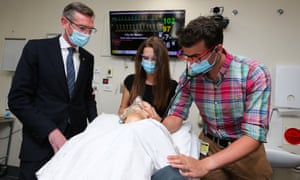
Updated
20:28
Good morning
Updated
Stay connected with us on social media platform for instant update click here to join our Twitter, & Facebook
We are now on Telegram. Click here to join our channel (@TechiUpdate) and stay updated with the latest Technology headlines.
For all the latest Covid-19 News Click Here


